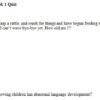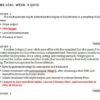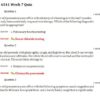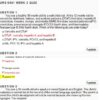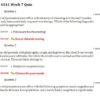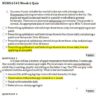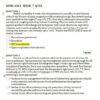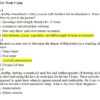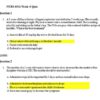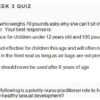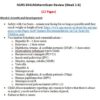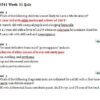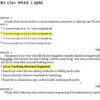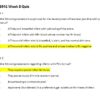Description
NUNP 6541N Midterm Exam Week 6 – Primary Care Adolescent and Child Spring Term (98 out of 100)
- Miguel, age 14, was hit in the eye with a baseball and developed eye pain, decreased visual acuity, and injection of the globe. Upon exam, you note blood in the anterior chamber and confirm the diagnosis of hyphema. What treatment do you recommend while Miguel is waiting to see the ophthalmologist?
- The father of a 3-year-old is concerned because of the child stutters. What should your approach be?
- A 2-day-old newborn with conjunctivitis is likely due to
- You see a 13-year-old who reports she is learning some basic geometry (areas, volume etc.). The ability to successfully master these concepts occurs during which Piaget developmental stage?
- For adolescent girls, peak height velocity should occur by Tanner Stage (SMR):
- Which is the correct order for the introduction of solid foods to an infant?
- I can walk well on tiptoes, my speech is 50% understandable, I know six body parts, but I cannot balance on one foot for 1 second. I am:
- You receive a phone call from the mother of a 2-year-old. She states her child has sleep refusal. You suggest the child should be able to:
- A 15-month-old boy says “mama” and “dada,” points and gestures if he wants things, and follows simple one-step commands. Your best response is which of the following?
- At what age would a child be expected to remember a string of numbers and repeat them backward?
- A 13-month-old child is noted to be at the 25th percentile for weight, the 10th percentile for height, and less than the 5th percentile for head circumference. She was born at term. She was noted to have a small head at birth, to be developmentally delayed throughout her life, and to have required cataract surgery shortly after birth. She currently takes phenobarbital for seizures. Which of the following would most likely explain this child’s small size?
- A child’s head circumference is routinely measured on each well visit until what age?
- A 14-year-old female comes into the office for an urgent visit after taking 10 valium tablets. Following the initial emergent care and stabilization, the most important part of the management is:
- All of the following are consistent with peritonsillar abscess except:
- Which of the following complication of strep pharyngitis cannot be prevented with antibiotics?
- A 4-year-old believes there is more juice in a tall, thin glass than a shorter, wider one. The child has not yet achieved which of the principles of Piaget?
- Josh, age 13, has some enlargement of the scrotum and testes, a reddened scrotal sac, and some hair texture alteration. His penis is not enlarged. He is in Tanner stage
- A breastfed infant is expected to have a lower incidence of which of the following?
- A 12-year-old male states he noticed an enlargement of his testes and scrotum. When counseling him about the next step in pubertal development, you state:
- You see a 7-year-old with complaints of “having accidents at night.” Physical exam and history are unremarkable. Urinalysis, urine culture, and specific gravity are normal. His parents ask about the best treatment for this problem. The best response is
- Chelsea, age 8, complains that she feels as if something is stuck in her ear. What action is contraindicated?
- By what age should most children be able to sit well without support?
- A typically developing 8-year-old girl will have which of the following genital development?
- John is diagnosed with allergic conjunctivitis. What type of discharge do you expect to see upon exam?
- Which of the following vaccines is routinely recommended at 4 months of age?
- An 8-year-old female has an edematous, mildly erythematous right upper eyelid for 2 days with a fever of 102.9 (F). Which important eye assessment do you need to consider?
- Role-play with equipment during the course of the physical exam would be the most beneficial with which age group?
- Conductive hearing loss can be caused by
- You see a 30-month-old who speaks in mixed Spanish and English. The child’s vocabulary is normal but at the low end of the normal language spectrum. The parent is worried the child’s development will not be normal because she mixes up the two languages. You respond:
- Mark is in the exam room. You are concerned he may have epiglottitis. In what position do these patients prefer to sit?
- The mother of a 4-year-old tells you he likes to “play with himself” while playing and watching television. You advise the mother to
- Parents bring their 6-month-old son to see you. He is symmetrically less than the 5th percentile for height, weight and head circumference. He was born at 30 weeks gestation and weighed 1000g. He was a planned pregnancy, and his mother’s prenatal course was uneventful until an automobile accident initiated the labor. He was ventilated for 3 days in the intensive care unit but otherwise did well without ongoing problems. He was discharged at 8 weeks of life. Which of the following is the most likely explanation for his small size?
- You assess a 15-year-old’s visual acuity and note her vision to be 20/50 in the right eye. She asks you what that means and you respond
- During a “well-child” visit, the parents of a healthy 5-month-old offer a great amount of information. Which of the following bits of information is of most concern?
- You are performing an examination of a 3-year-old who is new to your office. Which finding requires immediate further evaluation?
- A 9-year-old who weighs 70 pounds asks why she can’t sit in the front passenger seat of the family car. Your best response is
- Which of the following would not suggest an eating disorder with a purging component?
- A fifteen-year-old female makes a statement to you during a good visit. Which of the following statements should not be kept confidential?
- Sarah, age 15, presents with pain and pressure over her cheeks and discolored nasal discharge. You cannot transilluminate the sinuses. You suspect which common sinus to be affected?
- A 6-month-old infant has been growing poorly. His parents have changed his formula three times without success. His examination is remarkable for a pale, emaciated child with little subcutaneous fat and anterior fontanelle fullness. His laboratory test results are notable for hemolytic anemia and prolonged bleeding times. Which of the following is the most appropriate next step?
- Medicaid provides health insurance coverage to
- The mother of a 5-year-old informs you that her daughter cheats when playing board games. What is the best response?
- Which of the following substances is associated with pupillary constriction?
- A 7-year-old has just been diagnosed with attention deficit hyperactivity disorder (ADHD). Her parents report that she is doing poorly in school and is disruptive in the classroom. They ask you what they can do. Your best response is:
- Flourescein staining of the eye is used to detect a
- Luke, a 17-month-old, failed treatment with amoxicillin for otitis media. At the two-week recheck, his TM was still erythematous and you cannot see the landmarks. He has persistent nasal congestion, he is not sleeping at night, and he has a 101°F fever. What is the next best step for Luke?
- All of the following may predispose a patient to thrush except:
- Head and chest circumferences should be equal at:
- The diagnostic criteria for autism spectrum disorder include all of the following except
- Which of the following statements about bullying is true?
- The most likely weight of a 1-year-old whose birth weight was 6-1/2 pounds would be:
- An eye that deviates in when covered but that returns to midline when uncovered is an
- A 7-year-old boy with mental retardation was born at home at 26 weeks gestation to a 28-year-old mother who had received no prenatal care. An evaluation is likely to suggest his MR is related to which of the following?
- The most common substance used in middle school is
- A 2-day-old infant has significant nasal and rectal bleeding. He was delivered by a midwife at home; the pregnancy was without complications. His Apgar scores were 9 at 1 minute and 9 at 5 minutes. He has breastfed well and has not required a health care professional visit since birth. Which of the following vitamin deficiencies might explain his condition?
- Tammy, age 3, is at the office for her well-child visit. She has trouble removing her own shirt as requested. Her mother yanks off her shirt after smacking her wrist and saying, “you must do as you’re told quickly.” Which action is indicated?
- A 4-month-old child has poor weight gain. Her current weight is less than the 5th percentile, height about the 10th percentile, and head circumference at the 50th percentile. The planned pregnancy resulted in a normal, spontaneous, vaginal delivery; mother and child were discharged after a 48-hour hospitalization. Feeding is via breast and bottle; the quantity seems sufficient. The child has had no illness. The examination is unremarkable except for the child’s small size. Screening laboratory shows the hemoglobin and hematocrit are 11 mg/dL and 33% respectively, with a platelet count of 198,000/mm3. Serum electrolyte levels are sodium 140, chloride 105, potassium 3.5, bicarbonate 17, blood urea nitrogen 15, and creatinine 0.3. Liver function tests are normal. Urinalysis reveals a pH of 8 with occasional epithelial cells but no white blood cells, bacteria, protein, ketones, or reducing substances. Which of the following is the most appropriate therapy for this child?
- A teenage female who is overweight has moderate acne on the face and chest and irregular menses.
- Elevation of which laboratory test provides the test evidence of polycystic ovarian syndrome?
- A 2-year-old boy has been slightly less than the 50th percentile for weight, height, and head circumference, but in the last 6 months, he has fallen to slightly less than the 25th percentile for weight. The pregnancy was normal, his development is as expected, and the family reports no psychosocial problems. The mother says that he is now a finicky eater (wants only macaroni and cheese at all meals), but she insists that he eat a variety of foods. The meals are marked by much frustration for everyone. His examination is normal. Which of the following is the best next step in his care?
- I like to use my pincer grasp that involves the ability to pick up a small object such as a raisin or piece of cereal with the thumb and forefinger, and that is mastered around what age?
- An 11-year-old girl has dizziness, pupillary dilation, nausea, fever, tachycardia, and facial flushing. She says she can “see” sound and “hear” colors. The agent likely to be responsible is which of the following?
- An 8-year-old female is brought into the office by her mother. She has had complaints of fever and sore throat for the past 2 days. She denies difficulty swallowing but has loss of appetite and mild diarrhea. A few classmates have similar symptoms. A review of systems reveals clear nasal drainage, dry cough, and hoarseness. On exam she has a 101.5 temperature, 3+ erythematous tonsils, and anterior cervical lymphadenopathy. What is the likely diagnosis?
- Appropriate advice for a mother of a 2-week-old child here for a “well-child” visit includes which of the following?
- What is the most traumatic, yet common form and of child abuse seen in pediatric primary care?
- Which of the following is a priority nurse practitioner role to help children and adolescents to have healthy sexual development?
- Appropriate anticipatory guidance for the parents of an 8-year-old girl includes
- Max, a 9-year-old boy, is a very active child with limited self-control. He is easily distracted and has difficulty staying on task. You determine that he should have a neurodevelopmental evaluation because he is showing signs of
- Which of the following injuries is most likely to be caused by the abuse of a toddler?
- Which of the following issues or concepts is relevant to the school-age child?
- While assessing the skin of an infant, you note cafe-au-lait spots. Which disease should be ruled out?
- The first sign of the onset of female puberty is usually:
- A mother states that her 4-year-old son constantly grinds his teeth at night. You document this as:
- Which of the following characterizes middle adolescence (14 to 16 years old)?
- I can roll over, grasp a rattle, and reach for things and have begun feeding myself finger foods, but I can’t wave bye-bye yet. How old am I?
- You would be concerned about the language development of a child who:
- Most children can independently get dress by themselves by age:
- A differential diagnosis for child abuse would include all of the following except.
- Which of the following eye findings would be considered an ophthalmic emergency?
- A 2-year-old child weighs 34 lb. What type of car seat should the child use?
- An expected milestone of a 4-year-old is the ability to
- Sam has otitis media. He also presents with conjunctivitis. This is due to which organism?
- A 14-year old has ataxia. He is brought to the local emergency department, where he appears euphoric, emotionally labile, and disorient. Many notice his abusive language. Which of the following agents is most likely responsible for his condition?
- What method can be safely used to remove cerumen in a 15-month-old child’s ear?
- The appropriate lab tests in the assessment of cervical adenitis include all of the following except:
- Which of the following represents normal sequencing of development in a toddler?
- You see a young child who has tripled her birth weight and looks for hidden objects. When given blocks, she places one in each hand. She has a fine pincer grasp. On the floor, she walks around holding objects and is trying to take independent steps. This child is most likely how old?
- During a domestic health assessment, the CDC recommends screening every refugee child for which of the following diseases?
- A 4-month-old presents with both eyes turning inward. What is this called?
- A mother brings her 4-week-old infant into the office because she noticed small yellow-white glistening bumps on her infant’s gums. She says they look like teeth but is concerned that they may be cancer. You diagnose these bumps as
- The parents of a 7-year-old are concerned their son does not want to attend school. Which of the historical findings are not usually associated with the diagnosis of school phobia?
- You are doing a kindergarten physical on a 5-year-old girl. Which of the following scenarios would suggest the child is not ready to start kindergarten in the fall?
- Which of the following children should be referred for a comprehensive developmental evaluation?
- Sarah, 7 years old, is in the office today. All of the following are acceptable management options for allergic rhinitis, except
- You see a 3-year-old for a well-child visit. His mother informs you that potty training has been very easy because he “has an amazing internal clock. He falls asleep, gets hungry, and has bowel movements at the same time every day.” This describes which aspect of temperament?
- You see a healthy 18-month-old for a well-child visit. At the 12-month visit he received diphtheria, tetanus, and acellular pertussis (DTaP) third dose; hepatitis B second dose; measles, mumps, and rubella (MMR) first dose; injected poliovirus (IPV) second dose; pneumococcal conjugate (PCV13) fourth dose; and Haemophilus influenzae type B (Hib) fourth dose. Which of the following do you order today?
- The results of the hemoglobin A1c test are LESS reliable in children with which of the following conditions? (Hint: select two)
- You see a 5-month-old who is fussy, has interrupted sleep and is drooling. You note large lower lateral incisor bulges. You recommend:
- A 7-month-old male is found to have a spiral fracture of the femur that his father says he got by climbing onto a chair and then jumping off. Which of the following statements is true regarding this situation?
- The nurse practitioner role was initially established to
- Which of the following is a true contraindication of vaccinating a child



